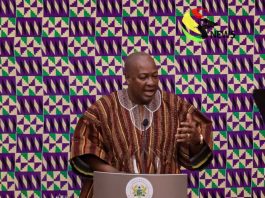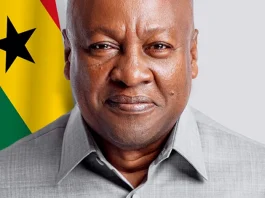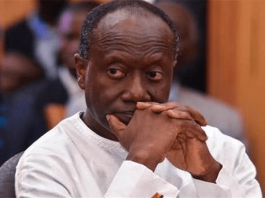President John Dramani Mahama has thrown his support behind a proposed Private Member’s Bill seeking to mandate a minimum 5% employment quota for Persons with Disabilities (PWDs) in public and private sector institutions across Ghana.
President Mahama publicly made this endorsement of the Bill during his delivery of the first State of the Nation Address (SONA) of his 2nd term.
Ghanaians and the international community were on Thursday, February 27 2025, turned to their set attentive to Parliament in Accra as President John Dramani Mahama delivered his first State of the Nation Address (SONA) in his historic second term.
The address, a constitutional requirement under Article 67 of the 1992 Constitution, highlighted the true state of affairs in key sectors of the economy; challenges inherited; and the government’s roadmap for recovery and transformation.
However, President Mahama’s endorsement of the Bill during the first SONA signals a renewed national commitment to disability rights and inclusive governance.
As Ghana strives for equity in employment, the proposed legislation is expected to spark national debate and drive policy reforms aimed at ensuring fair job opportunities for all citizens, regardless of physical ability.
The bill, spearheaded by the Member of Parliament for Madina Constituency in the Greater Accra Region, Honourable Francis-Xavier Sosu, aims to address the long-standing discrimination and exclusion of PWDs in the job market by making their employment a legal requirement rather than an option.
Honourable Sosu, in his request to Parliament’s Legislative Drafting Office, emphasized that despite existing anti-discriminatory laws, many PWDs continue to face economic marginalization.
Hon. Sosu further highlighted that Ghana’s lack of a structured employment policy for disabled persons has worsened their socio-economic conditions.
He noted, “Our society does not seem to consider PWDs as productive components of mainstream society. It is time to change this narrative,” he stated.
Data from the Ghana Statistical Service (GSS) shows that 8% of Ghana’s population—approximately 2.4 million people—live with some form of disability, a significant rise from 3% in 2010. However, despite their qualifications and capabilities, PWDs still struggle to secure meaningful employment.
Challenges faced by PWDs in Ghana include:
– Inaccessible workplaces and transport systems
– Lack of disability-friendly policies in companies
– Stigma and misconceptions in the job market
– Limited vocational training opportunities
– Fear among employers of legal challenges if PWD employment does not work out
Hon. Sosu cited the abrupt termination of the employment of PWDs at toll booths as a major setback, leaving many without sustainable income. He has also criticized the inconsistent disbursement of the 2% District Assembly Common Fund (DACF) allocated to PWDs, which has further worsened their financial struggles.
The bill proposes a compulsory employment quota of 5% for PWDs in all institutions to promote inclusion and economic empowerment.
Honourable Sosu stressed that passing such a law would not only protect marginalized groups but also contribute to Ghana’s achievement of Sustainable Development Goals (SDGs) 1, 2, 3, 4, 5, 8, and 10, which focus on poverty reduction, zero hunger, good heath and well-being, quality education, gender equality, decent work and economic growth, and reduced inequalities.











